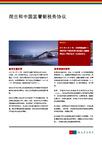
May 2013 - New tax treaty between the Netherlands and China
New tax treaty between the Netherlands and China
DOUBLE TAXATION AVOIDANCE
On 31 May 2013, the Treaty and Protocol were signed, replacing the old agreement from 1987. Both the Netherlands and China still need to complete their internal procedures necessary for the entry into force of this Treaty. It will enter into force on the last day of the month following the last notification. Assuming both states take appropriate actions, it is possible that the Treaty will have effect for any year beginning on or after 1 January 2014 at the latest (for income derived during taxable years).
The Treaty should allow for advantageous tax planning between China and the Netherlands, or, as the case may be, through the Netherlands for Chinese overseas foreign direct investments. The Treaty should typically allow for reduction or even elimination of withholding taxes.
Chinese investors can benefit from this favorable Treaty by using the Netherlands as a hub for outbound structuring of its foreign investments. Many global companies use the Netherlands for tax structuring purposes because of its competitive (tax) system.Examples are the extensive Netherlands tax treaty network, the many investment treaties the Netherlands has concluded to guarantee protection from expropriation, flexible corporate law and an attractive investment climate in the Netherlands which has significant tax benefits, such as the participation exemption, under which dividends and capital gains from qualifying participations are fully exempt from corporate income tax in the Netherlands.
DIVIDEND WITHHOLDING TAX
Provided certain conditions are met the Dutch withholding tax on dividends at rate of 15%, or as the case may be the Chinese withholding of 10%, can be reduced to 5%. Such reduced rate applies when the recipient is an entity (not being a partnership) which owns directly at least 25% of the capital of the company paying the dividends. Under Chinese domestic law, when applying for this reduced rate, there needs to be a 12 months holding period with respect to the 25% ownership, i.e., one can not increase the ownership to 25% and then apply the Treaty provision.
Typically, Chinese investors use a Netherlands Cooperative (“Coop”) for cross border investments. A Coop is taxed similar as Netherlands limited liability companies and can also be incorporated with excluded liability for its investors. One of the main advantages is that under Netherlands domestic law, dividends from the Coop to its investors are not subject to Netherlands dividend withholding tax when structured properly.
Under the Treaty, the withholding tax rate on dividends is also reduced to nil when dividends are paid to certain qualifying receiving companies. Generally speaking this nil rate applies when dividends are paid to the government, any of its institutions or any other entity whose capital is (in)directly owned by the government.
If the recipient is in the Netherlands, no minimum ownership or holding requirements exist (in this Treaty or under Netherlands domestic law) to fully exempt the income, both dividends and capital gains, received, making the Netherlands comparatively more beneficial than other countries.
INTEREST WITHHOLDING TAX
The Netherlands does not impose interest withholding tax under its domestic tax law. The domestic withholding tax rate on interest in China of 10% is reduced to 0% in the Treaty for interest on loans guaranteed or insured by the government or a local authority, the Central Bank, or a financial institution which is fully owned by the Netherlands.
ROYALTY WITHHOLDING TAX
No withholding tax on royalties is imposed by the Netherlands under its domestic tax law. The domestic withholding tax rate on royalties in China of 10% is reduced to 6% in the Treaty insofar the royalty relates to the use of, or the right to use, industrial, commercial or scientific equipment.
CAPITAL GAINS TAX
On the basis of the Treaty, capital gains are in principal taxed in the country of residence of the transferor of the asset. However exceptions apply for capital gains on immovable property situated in the other ‘source’ state and capital gains realized upon the alienation of movable property attributable to a permanent establishment in the other ‘source’ state. Capital gains, realized on thetransfer of shares of a company that derives more than 50% of its asset value directly or indirectly from immovable property may also be taxed in the country where the immovable property is situated. Capital gains derived by a resident of a contracting state from the alienation of shares in an entity resident in the other contacting state may be taxed in that other contracting state if the recipient owned (in)directly a participation of at least 25% in the capital of that entity at any time during the 12 months preceding the alienation.
ANTI ABUSE PROVISION IN THE TREATY
The reduced withholding tax rates on dividends, interest and royalties do not apply if the main or one of the main purposes was to take advantage of the Treaty. It is also mentioned that both contracting states may continue to apply their domestic anti-abuse provisions, insofar as they do not give rise to taxation contrary to the Treaty.
MISCELLANEOUS
The Treaty also applies to the Caribbean part of the Netherlands, i.e. Bonaire, Saba and St. Eustatius. However, according to the Protocol, it does not apply to Netherlands tax exempt investment institutions. Contrary to the OECD Model treaty, this Treaty states that supervisory activities in connection with a construction site also constitute a permanent establishment.
Moreover, the Treaty no longer contains a tax sparing credit. Under the current treaty the tax sparing credit is 10% for interest and 15% for royalties. Finally, the extended and updated exchange of information provisions are included in this Treaty.
Want to know more?



